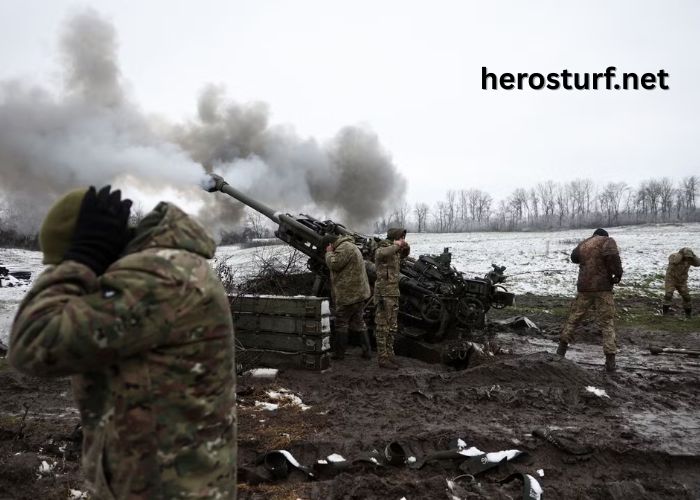The Guerre en Ukraine has been one of the most defining conflicts of the 21st century. Beginning in 2014, it has shaped the political landscape of Eastern Europe and has drawn the attention of the global community. The war escalated significantly in 2022, with Russia’s full-scale invasion of Ukraine, which led to widespread destruction and humanitarian crises. The conflict has drawn the involvement of several countries, and its consequences have affected global security, economics, and international relations. The Guerre en Ukraine has been a key issue in international forums, with efforts toward peace often met with challenges.
The war has deeply impacted not only Ukraine and Russia but also the global political order, creating divisions and forcing countries to take sides. The effects of this war, from the humanitarian crisis to the economic sanctions, are still being felt around the world. The Guerre en Ukraine has also drawn comparisons to other significant global conflicts, raising questions about the future of international diplomacy.
What Are the Causes of the Guerre en Ukraine?
The causes of the Guerre en Ukraine are complex and multifaceted, rooted in historical tensions and geopolitical struggles. Ukraine’s desire for greater integration with Western Europe and NATO has been a central issue. Russia perceives this as a direct threat to its sphere of influence and security. The annexation of Crimea by Russia in 2014, followed by the support for separatists in Eastern Ukraine, marked the beginning of the escalation.
Another critical factor contributing to the Guerre en Ukraine is the long-standing cultural and political divisions within Ukraine itself. While western Ukraine has leaned towards European integration, eastern Ukraine has been more sympathetic to Russia. These divisions have been further exacerbated by Russia’s involvement, leading to a broader conflict that reflects both regional and international interests.
How Has the Guerre en Ukraine Affected Global Politics?
The Guerre en Ukraine has had significant ramifications on global politics, particularly in relation to Russia’s relationships with Western countries. The war has led to widespread sanctions against Russia, targeting its economy, military, and political elite. These sanctions have disrupted global trade and caused economic instability in Europe and beyond.
Additionally, the war has intensified NATO’s presence in Eastern Europe, with countries like Poland and the Baltic states seeking stronger alliances with the West. The Guerre en Ukraine has thus reshaped NATO’s strategy and its role in global security. Russia, on the other hand, has sought to strengthen ties with non-Western powers, such as China and India, in an effort to counterbalance Western influence.
What Are the Humanitarian Impacts of the Guerre en Ukraine?
The humanitarian impacts of the Guerre en Ukraine have been devastating. Thousands of civilians have been killed, and millions more have been displaced, both within Ukraine and to neighboring countries. The United Nations has reported that the conflict has caused one of the worst refugee crises in Europe since World War II.
In addition to the displacement of people, the Guerre en Ukraine has caused widespread destruction of infrastructure, including homes, hospitals, and schools. The long-term impact on the population is severe, with many facing mental health challenges, loss of livelihoods, and uncertain futures. The humanitarian response has been a critical focus, with international organizations working to provide aid, but the situation remains dire.
How Has the Guerre en Ukraine Impacted the Global Economy?
The Guerre en Ukraine has had far-reaching economic consequences, especially for global energy markets. Ukraine is a major transit route for natural gas from Russia to Europe, and the war has disrupted these supplies. The resulting energy shortages have driven up prices and led to an energy crisis in Europe, impacting businesses and households.
Additionally, the Guerre en Ukraine has caused significant volatility in global food markets. Ukraine is one of the world’s largest producers of grain, and the conflict has disrupted production and export, leading to food shortages and rising prices worldwide. These economic disruptions have contributed to inflation in many countries, making the effects of the war felt far beyond the borders of Ukraine.
What Are the Prospects for Peace in the Guerre en Ukraine?
The prospects for peace in the Guerre en Ukraine remain uncertain. Several peace talks have been held, but no lasting agreements have been reached. Russia’s demands for territorial control and Ukraine’s insistence on sovereignty have been significant obstacles to negotiations. International efforts to mediate peace have been met with resistance, and both sides have continued military operations.
The role of external actors, such as the United States, the European Union, and China, is crucial in shaping the future of peace in the Guerre en Ukraine. However, the deep-rooted political and territorial issues make a resolution challenging. As the war continues, it remains unclear when or how it will end, and what the long-term effects will be on the region and the world.
Conclusion
The Guerre en Ukraine remains a complex and ongoing conflict with profound implications for Ukraine, Russia, and the global community. The causes of the war are deeply rooted in historical, cultural, and geopolitical factors, while its impact has reverberated through global politics, the economy, and humanitarian concerns.
As efforts toward peace continue, the future of Ukraine and the broader region remains uncertain. The Guerre en Ukraine is a stark reminder of the fragile nature of global peace and the far-reaching consequences of war.

